Drink coffee, be productive, and create something amazing at one of these ten D.C. coworking spots.
Hey! This article is out of date. Click here to see the latest version.
In a matter of months, D.C.’s quiet coworking scene has welcomed new players that could revolutionize the way this city thinks about and uses shared workspaces, not to mention opening up exponentially more desks than had been available.
Coworking provides physical office-like space to members whose sole proprietorships or small businesses would otherwise leave them working from home or coffee shops. Some spaces focus on a business niche, like tech startups or nonprofits, while others open the doors to anyone who can stoke the creative fires that keep these places popular.
Wifi access and desk space are common amenities, while many offer conference rooms for rent, couches for brainstorming and evening events or speaker sessions. Some focus more on providing affordable office space for small-staffed companies while a new breed of space is trying to compete with neighborhood coffee shops for casual coworkers.
Much has changed since we published our
first coworking guide last spring. Over the past year, the District has welcomed a couple behemoths of coworking that are growing exponentially the number of available desks in the District.
The national coworking brand,
WeWork, came to town early this year and offers a total of 900 new spaces in Chinatown and Shaw. When
UberOffices’ third space opened in Dupont Circle in the fall of 2013, it boasted six times the square footage of any existing coworking space in the District. And the local chain has plans to open another in Bethesda this spring.
“We were at that time the largest coworking space in D.C., and today we're one of the smallest,” says Martin Ringlein, cofounder of the 6,000-square-foot
Canvas Co/Work in Dupont Circle.
“The successes we and others have had are now proving to be models for others such as WeWork and UberOffices to take a chance on Washington, D.C.,” Ringlein says.
Also new to D.C.’s scene is
Cove, a company that intends to offer a “productive space” for casual users rather than adhering to a strict definition of coworking.
“I still work from home and coffee shops, but I work from Cove when I want to be really productive and social,” Cove Founder Adam Segal says. “The average person comes in for a couple hours and then leaves.”
According to
Deskmag’s annual Global Coworking Survey, demand for coworking spaces in the country still outweighs supply, and most existing spaces have plans to expand their operations this year. The majority of coworkers report a boost in creativity from joining a space and improvement in their standards of work, according to Deskmag’s surveys.
Charles Planck, cofounder of D.C.’s longest running coworking space,
Affinity Lab, says members of the space have an 85-percent continuity rate for their businesses, compared with some 80 percent of businesses failing on their own in the U.S. market.
“What makes a coworking space effective, or can make it effective, is that focus on the human piece,” he says.
Being surrounded by innovative, like-minded workers, Planck says, helps members get more done in less time.
While coworking provides a place for business relationships to happen organically, the spaces are distinct business incubators or creator spaces. Incubators like
1776, which opened last year, work closely with their occupants to mentor and grow the new businesses, often focusing on a specific business sector or industry. 1776, for example, does offer coworking space, but only to members selected for the incubator program, says Evan Burfield, cofounder of the space.
Makerspaces, where members can manufacture products, may be the next frontier of shared workspaces. The 16,000-square-foot
Ideaspace near the Navy Yard, which opened in February, sold out its first round of memberships in a week.
This list of coworking spaces in the heart of D.C. is one that’s sure to grow.
Prices and membership levels vary by location. Check out each space's website to learn more and to learn how to join.
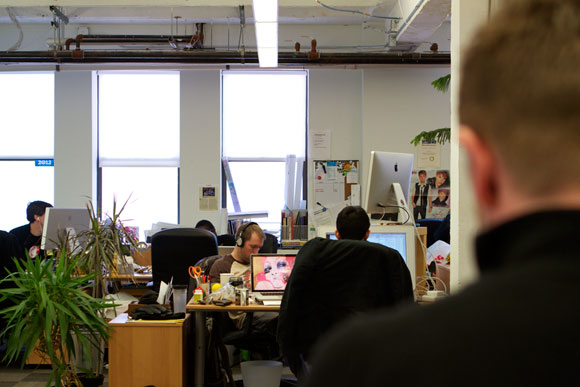 Affinity Lab
Affinity Lab
920 U Street
U Street Corridor
http://affinitylab.com
Launched in 2001 in Adams Morgan, Affinity Lab is the oldest continually operating coworking space in the District — and arguably in the world, says cofounder Charles Planck.
Planck prides himself on curating the 5,000-square-foot space for people who “work and play well with others.” Affinity Lab’s culture is based on authenticity and collaboration, so much so that members have moved from one member company to another without ill will.
“What we did is create a cultural context of coop-etition. It’s actually a good thing to have multiple organizations of the same type” so they can collaborate on projects, Planck says.
But the space, which boasts conference rooms, a kitchen and a disco ball, doesn’t try to appeal to a particular business niche, choosing instead to foster an “entrepreneurial ecology” where diversity helps everyone flourish.
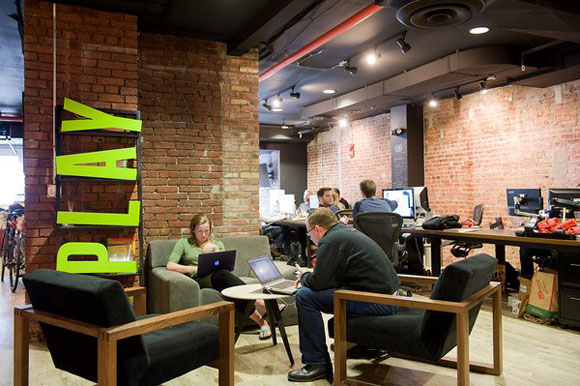 Canvas Co/work
Canvas Co/work
1203 19
th St. NW
3
rd Floor
Near Dupont Circle
canvas.co/work
When Canvas Co/work opened its doors two years ago, D.C. still wasn’t used to this idea of “coworking.”
But what might be distractions to some — background music, ping pong tables and an Apple TV — are creativity inducers to the 75-some members who now call Canvas Co/work “the office.”
Other amenities include whiteboards for brainstorming, snacks and coffee (provided by a coffee startup in the space), Herman Miller chairs for comfort and dishwashers in the kitchen. Canvas also hosts events like
Startup Jackpot and houses several startups.
Canvas originally focused on attracting web designers and developers, since those were the fields of its founding business partners. But the space now welcomes anyone who’s a good fit to its “motley crew” of creative individuals.
Canvas expanded last year to 6,000 square feet, double its original size, to accommodate additional members.
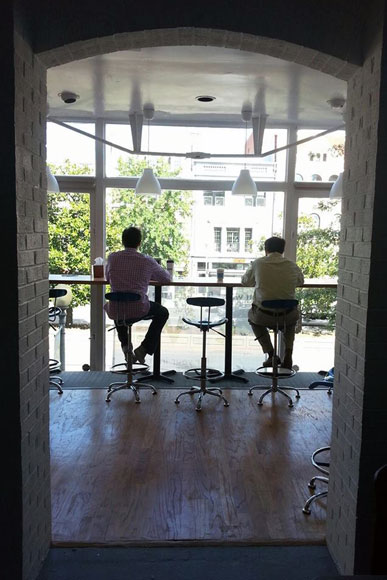 Cove
Cove
1730 Connecticut Avenue NW
Dupont Circle
1624 14
th Street NW
14
th Street location
http://cove.is
Cove’s Founder Adam Segal says he intends for his new iteration of shared workspaces to compete with “your living room and coffee shops” for your work hours.
The first location opened in Dupont Circle in late September, followed by the second location early this year — and Segal says more are in the works.
Cove members don’t have a dedicated desk but use the space for a few hours here and there as they would a coffee shop — one where you’re encouraged to stay and work a while without having to buy more lattes. Members purchase a package of hours to use the space — 8 hours for $24 or 50 hours for $124 — and check in with their phones upon arrival.
At around $3 per hour, Cove is priced like a latte (an argument several coworking spaces have tried make in one form or another). Although, Segal is honest about the quality of the Keurig coffee offered at Cove.
“Our specialty isn’t coffee; it’s productivity,” he says, adding that Cove partners with nearby coffee shops to offer deals and, occasionally, in-house brews of a higher quality.
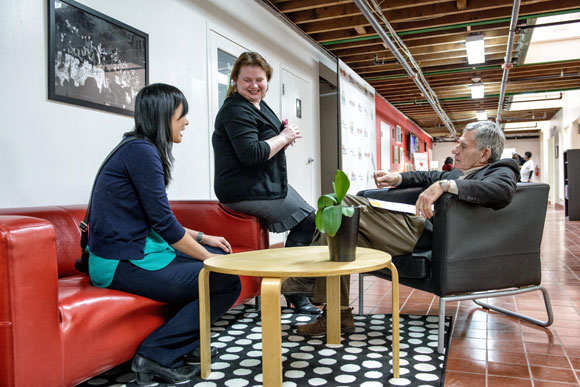 The Hive 2.0
The Hive 2.0
1231-B Good Hope Rd. SE
Anacostia
Thedchive.com
The Hive started in the fall of 2010 to not only provide a creative workspace to the Anacostia community but also to aid in its revitalization through arts, culture and small business development. The space expanded last year to include a second location called The Hive 2.0, but the two spaces are now consolidating into the new one.
The
Arch Development Corporation that backs the Hive also runs art galleries and a digital print lab in the vicinity, with much of the neighborhood’s art displayed in the workspaces. The Hive was the result of a community meeting in which residents said they had to leave the area to find coworking or office spaces, says managing director Nikki Peele.
The space includes ‘round-the-clock access to the fully furnished offices as well as free technical assistance and workshops.
The Hive houses businesses as diverse as government contractors and nonprofits while fostering a “creative economy” for graphic designers and artists. Surrounded by a theater, coffee shops and art space, The Hive 2.0 is the only coworking space east of the Anacostia River, Peele says.
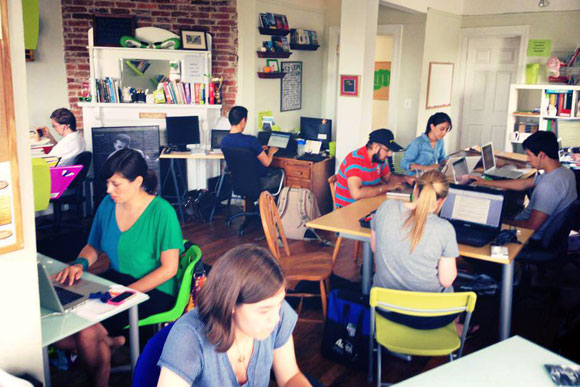 Punchrock
Punchrock
1800 Wyoming Ave NW
Adams Morgan
http://punchrockdc.com
Punchrock launched its small space in Adams Morgan in the fall of 2012 with an eye for serving the businesses that are trying to change society. “Social innovators” is the niche market for this coworking space, and they’re not talking about businesses that use social media.
“Usually we define social entrepreneurs as those that are using their business to tackle societal issues,” says manager and founder of the space Roxie Alsruhe.
That includes businesses working within education, trying to fight hunger — and
one making cool sunglasses that come with a pair of prescription lenses for those in need.
Alsruhe says the space found a natural home in D.C., where many people land as NGOs, politicians or business owners to try to make a difference.
“We felt there wasn’t a space where all these players were meeting regularly,” Alsruhe says. “We wanted to fill that need and grow the field.”
Punchrock (a word that symbolizes challenging the status quo) includes about 15 business members and, often, a few office dogs. Asruhe describes the space as looking “like a hostel” more than an office, with glass tables and markers for brainstorming in lieu of marker boards.
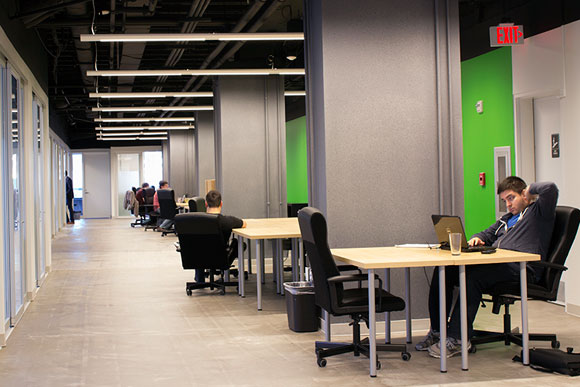 UberOffices
UberOffices
1200 18
th Street NW
Suite 700
Dupont Circle
UberOffices.com
In less than a year, UberOffices has launched new coworking spaces in Rosslyn, Tysons Corner and Dupont Circle, each of them outfitted with exposed ceilings, concrete floors and glass walls for a modern-industrial look. Outdoor spaces like balconies or rooftop patios at each location are a boon for after-work events.
Uber’s first space in Rosslyn sold out in less than two months, and the other two spaces are about 75 percent full, says cofounder Raymond Rahbar.
The company was the first to launch such large-scale coworking facilities in the District, with it’s Dupont Circle space offering two floors and 38,000 square feet of work space.
Though known for housing tech-minded startups like Tech Cocktail, Rahbar says UberOffice’s locations are open to “really anybody with an entrepreneurial outlook.”
The spaces focus on providing offices to small companies with fewer than a dozen employees as well as open desks for coworking individuals or groups.
UberOffices began creating coworking spaces because real estate had been one of the “biggest pains” of starting businesses for its founders, Rahbar says.
“It was tough to be in a good space at a reasonable price with people that were like-minded. So we’re trying to combine everything in one,” Rahbar says.
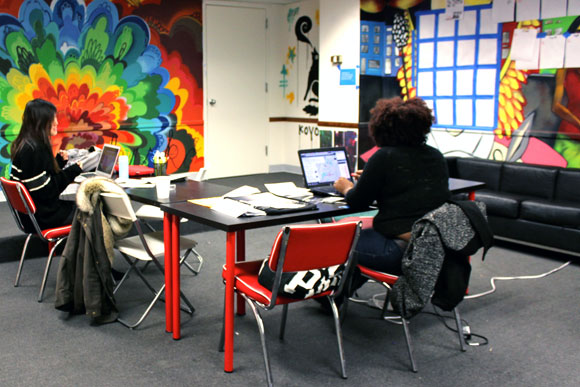 WorkDistrict
WorkDistrict
2217 14
th Street NW
U Street Corridor
http://workdistrict.com
After selling out of office space within a couple months of opening, this coworking space quickly posted on its Facebook page, “Don’t worry — we just built out a few more.”
The space launched in early 2013 with a focus on going above and beyond coworking— linking its members to not only wifi and coffee but also to potential resources for crowdfunding. A firm working to make crowdfunding a legal reality for U.S. businesses cofounded the space and is working toward new federal regulations that would allow it, says Patrick Menasco, co-founder and CEO of WorkDistrict.
Menasco says they’re still focusing on the space, which has room for about 70 members. Formerly host to Living Social events, the “edgy” 2,800-square-foot building features graffiti art throughout, courtesy of some of D.C.’s best artists in the medium.
Menasco says WorkDistrict is also considering a foray into hosting “code courses.” The space piloted an academy called CodeDistrict that would bring industry expertise to new businesses that need it.
 WeWork
WeWork
718 7
th Street NW
Chinatown
641 S Street NW
Wonderbread Factory
Shaw
http://wework.com
It says something about D.C.’s burgeoning coworking scene that this national network of shared workspaces wanted to come to town. WeWork runs spaces in six other major cities, including San Francisco, Seattle and Boston, and saw in two unique buildings the opportunity to come to the nation’s capital, says Carl Pierre, WeWork’s city lead.
The company specializes in finding and reviving spaces with character in cool neighborhoods — and it saw potential most recently in Shaw and its former Wonderbread Factory.
“At first people said, ‘Really? Why Shaw?’ But there’s been a huge demand from people saying, ‘Oh yeah, I live right by there,” Pierre says.
The Shaw location has room for 550 new members. WeWork’s Chinatown location has room for 350 but is nearing capacity since it opened Feb. 1. (Pierre says the waiting list for its spaces in New York City is 7,000 people long.)
Desks at the space start at $325 a month and are held on a month-to-month basis. The locations are built specifically for coworking — and designed by the pros. They feature immaculate kitchens and edgy wallpaper along with light fixtures and furniture straight out of a Soho apartment.
“We just want to do one thing really well and that’s create the perfect office environment for members to be successful,” Pierre says.